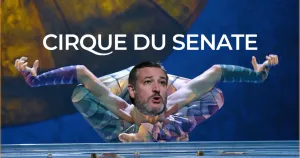The Briefing: An unremarkably farcical confirmation hearing.
- The first Black woman nominated to the Supreme Court
- What are the stakes?
- If Democrats hold together, Jackson will be confirmed
- But she wouldn't meaningfully alter the Court's makeup of six conservatives and three liberals
- An abrasive hearing
The Big Question: What could we do better?
The conventional case for public Supreme Court confirmation hearings is that they facilitate transparency and accountability. Towards the end of the twentieth century, Congress—first the House, then the Senate—implemented the full broadcasting of legislative business, including Supreme Court confirmation hearings. In theory, at least, citizens can watch Senators ask questions of nominees about their judicial philosophies. In turn, they can agitate Senators to vote for or against a nominee.
Of course, that’s not how things have turned out, as Jackson’s hearing has demonstrated. It’s been riven with nakedly partisan potshots that have little to do with Jackson’s fitness for the bench, like Ted Cruz’s interrogations about whether critical race theory is taught at Jackson’s daughters’ school. As a result, there’s been something of a renewed call to put this kind of business back behind closed doors. Nebraska Senator Ben Sasse, a Republican, responded to the behavior of his colleagues by registering his opposition to the ubiquity of cameras in Congress, a pet argument he’s been shopping around for some time. He’s not alone, either—others have argued that televised legislative business incentivizes performance over substance.
Jackson’s confirmation hearing suggests that Sasse and those who agree with him have a point, if not for all legislative business then at least for Supreme Court confirmation hearings. But should reforms come at the expense of transparency, which we ordinarily think of as being crucial to the flourishing of democracy?
The Theory: Lose the cameras?
First of all, the theatrics of Cruz and his colleagues are a nice example of what is sometimes called the “mediatization” of politics, a concept that I wrote about last week. The idea is that modern media, by allowing the direct broadcasting of a politician’s rhetoric and action to his or her constituents, alters the incentives that drive political behavior, and not always for the best. Instead of asking about a Court nominee’s judicial philosophy, it’s advantageous instead to capitalize on a hot-button issue like critical race theory. Ted Cruz being caught on camera checking his Twitter mentions after grilling Jackson is almost a too-perfect example of mediatization in action.
To that end, it’s worth engaging in a quick thought experiment to see what might happen if we shut off the cameras in Supreme Court confirmation hearings, as per Sasse’s recommendation. Would it change how politicians behave?
The answer, I think, is a pretty clear yes. Lindsey Graham has almost no reason to complain about past injuries to conservative court nominees if a YouTube clip won’t reach his base. Ted Cruz, a highly accomplished lawyer, is without a doubt aware that what Jackson’s children are reading in school has nothing to do with her judicial philosophy. Behind closed doors, without the siren song of Twitter likes and television soundbites, there might actually be some interest in how a nominee to the nation’s highest court will apply the law.
But Sasse’s argument isn’t without its flaws. First of all, Jackson—like most nominees who get Senate confirmation hearings—would likely be confirmed regardless of whether or not her hearings were public. Despite all the performance, the behavior of this or that senator isn’t decisive. Second of all, the motivations for vicious partisanship run deeper and wider than C-SPAN.
The Takeaway: A compromise solution.
I think there’s actually a reasonable compromise solution to these problems, one that treats confirmation hearings as proportionally important as they are (which is to say, not very), while striking a balance between transparency and encouraging more responsible discourse.
The idea is very simple. Journalists would be welcome to attend the hearings and write whatever they like about the proceedings. In addition, the Senate would be responsible for continuing to publish transcripts of the hearings, as it currently does. The only change would be that we take away the cameras.
Of course, low blows and pot shots would still make their way in. Reporters will sniff out the quotes that will get their coverage shared widely on social media, and before and after the hearings politicians will race to the nearest camera they can find to spout off.
But fewer people will be paying attention in the moment, for better or worse. Any drama will be described second-hand. Almost no one will be interested in reading a full-length transcript. That’s arguably a blow to transparency, but it’s not clear how much good “transparency” is doing if elected officials have no interest in conducting an elevated inquiry that serves the population.
Finally, within the context of a highly polarized politics—in which almost nothing substantive will change senators’ minds about how to vote on a nominee—these hearings are not all that important. Americans have a right to know how Court nominees think about the law, but that’s not something that highly publicized hearings seem capable of delivering. After the farce of Jackson’s confirmation hearings, maybe it’s time to try something different.
Subscribe to Spectacles

Comments
Join the conversation